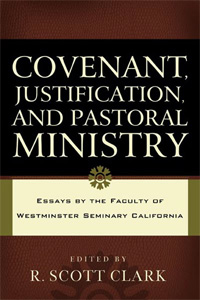Earl Morse Wilbur, the foremost historian of Unitarianism, identified the 1531 publication of Michael Servetus’s De Trinitatis Erroribus, which criticized orthodox Trinitarianism, as the start of the movement that developed into contemporary Unitarianism.1 After infiltrating Reformed, Presbyterian, Baptist, and Anglican churches in . . . Continue reading →
June 2014 Archive
Goodwin: The Whole Work of Salvation is Called ‘Mercy’
Those attributes which God accounts his greatest riches and greatest glory, Rom. 9:23, even his mercy and free grace, which he intends most to exalt, never saw light till now; the doctrine of salvation by Christ being the stage, wherein only it . . . Continue reading →
The Long And Winding Road To Escondido
(HT: Joe Coker)
Owen On Sanctification: Cleansing Ourselves Of Sin
Where sanctification is enjoined us as our duty, it is prescribed under this notion of cleansing ourselves from sin: “Wash you, make you clean,” Isaiah 1:16. “O Jerusalem, wash thine heart from wickedness, that thou mayest be saved,” Jeremiah 4:14. “Having therefore . . . Continue reading →
Marine Pilot Sticks Amazing Carrier Landing!
Fifteen (Mostly 19th-Century) Myths About The Middle Ages
There are a number of myths about the so-called middle ages: they thought that earth was flat etc. Most of these myths were fabricated in the 19th century. Why? Because that was the apex, in the West, of “Modernity,” the Enlightenment, when . . . Continue reading →
Is Faith A Virtue?
David asks, I know that we would say that faith is an instrument whereby we receive Christ’s imputed righteousness, but is there some biblical or theological reason why we would not want to say that faith is also a virtue? Can’t faith . . . Continue reading →
The Gospel To Diognetus (c. 150 AD)
[God] himself took on him the burden of our iniquities, he gave his own Son as a ransom for us, the Holy One for transgressors, the blameless one for the wicked, the righteous one for the unrighteous, the incorruptible one for the . . . Continue reading →
Facientibus Quod In Se Est Deus Non Denegat Gratiam
Machen: Christ Is All Or Nothing
But what was the difference between the teaching of Paul and the teaching of the Judaizers ? What was it that gave rise to the stupendous polemic of the Epistle to the Galatians? To the modern Church the difference would have seemed . . . Continue reading →
Good Will Hunting on Law/Gospel
Good Will Hunting is one of my favorite movies. In a pivotal scene, Robin Williams’s character repeatedly reminds Matt Damon’s character that the abuse he suffered from his foster parent is not his fault. I have not included the clip because the . . . Continue reading →
Mercy Musings: Psalm 5
Some thoughts from Psalm 5 this morning. I was especially struck by the first seven verses. 1Hearken to my words, O Lord, attend to my cry. 2Attend to the voice of my supplication, my King, and my God: for to thee, O . . . Continue reading →
Justification By Faith Alone Is A Refuge For Sinners
Since Paul knew that justification of faith is a refuge for those who lack righteousness of their own [cf. Romans chapter 5], he boldly infers that all who are justified by faith are excluded from works righteousness. But since it is certain . . . Continue reading →
Does Baptism Save?
Merrit asks this question. “Two friends and I have been talking about this verse (1 Peter 3:21) and passage for quite some time today. The more we seem to talk about it the more confused I seem to get about it.” Merritt, . . . Continue reading →
Calvin On Freedom From Bondage To The Law
Yet, when Paul speaks of the law creating servitude, he is speaking here of the way in which the Galatians misapplied the law… Furthermore, we believe that it is impossible to keep the law of God, but that the law simply reveals . . . Continue reading →
Good Old Fashioned Subjectivist Goo
In the 1920’s, J. Gresham Machen diagnosed not only the intellectual and theological drift of his day but of that which would continue to develop over the next 90 years. He wrote, The depreciation of the intellect, with the exaltation in the . . . Continue reading →
Calvin On Romans 8:4
verse 4. That the justification of the law might be fulfilled, etc. They who understand that the renewed, by the Spirit of Christ, fulfil the law, introduce a gloss wholly alien to the meaning of Paul; for the faithful, while they sojourn . . . Continue reading →
Office Hours: Sanctification And The Fruit Of The Spirit
If you’ve ever planted anything you did so because you hoped that what you planted would grow. When farmers plant seeds, they do so because the expect those seeds to die and to produce a new plant and from that plant new . . . Continue reading →
Yes There Is A Reformed Doctrine Of Justification
Recently I responded to John Armstrong’s post on the TIME magazine new Calvinist discussion. In his reply, John makes this startling claim: There is no monolithic Reformed voice on justification (especially re: imputation) and I would be very happy if we allowed a . . . Continue reading →
Charles Hodge On Romans 8:4
Verse 4. That the righteousness of the law might be fulfilled in us, &c. This verse expresses the design of God in sending his Son, and in condemning sin the flesh. He did thus condemn it, ἵνα, in order that the righteousness . . . Continue reading →











